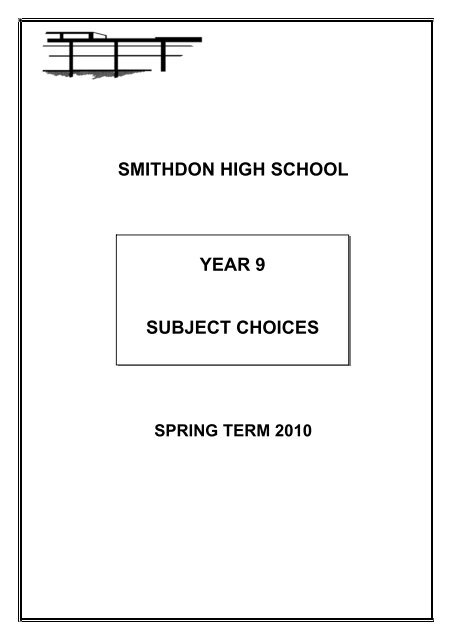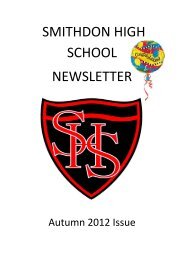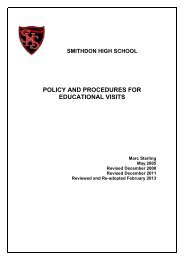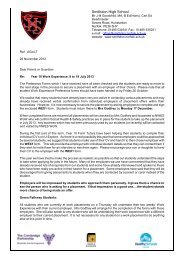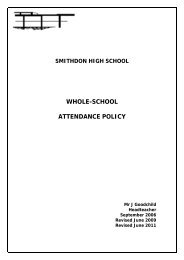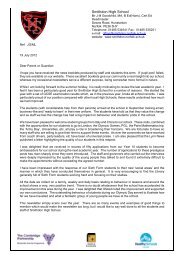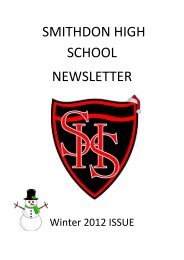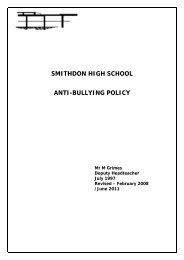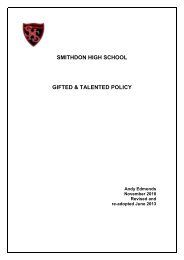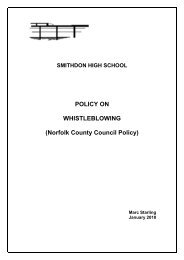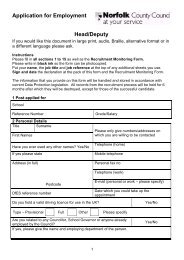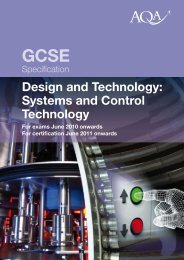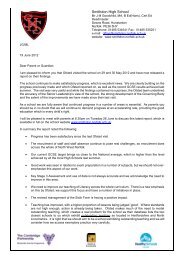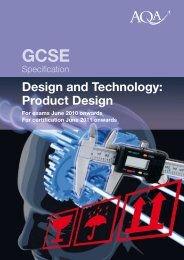YEAR 9 SUBJECT CHOICES SMITHDON HIGH SCHOOL
YEAR 9 SUBJECT CHOICES SMITHDON HIGH SCHOOL
YEAR 9 SUBJECT CHOICES SMITHDON HIGH SCHOOL
Create successful ePaper yourself
Turn your PDF publications into a flip-book with our unique Google optimized e-Paper software.
<strong>SMITHDON</strong> <strong>HIGH</strong> <strong>SCHOOL</strong><br />
<strong>YEAR</strong> 9<br />
<strong>SUBJECT</strong> <strong>CHOICES</strong><br />
SPRING TERM 2010
THE NEED FOR CHOICE<br />
In the Lower School (Key Stage 3) the aim is to give a broad and balanced education to each of<br />
our students. There is now a need to reduce the number of subjects studied which are externally<br />
examined in two years’ time. A reduction in the quantity of subjects means each one is studied to<br />
a greater depth.<br />
Every student is required to study English, Science, ICT, Mathematics, Philosophy and Ethics,<br />
Physical Education, and Design Technology. In addition students select up to three subjects.<br />
This pack is designed to help you and your son/daughter make the right choices. A brief outline<br />
of each subject including coursework, content and deadlines is shown. (Your child should be<br />
encouraged to consider carefully before making any choice as making changes is difficult.) When<br />
making the choice they should remember that they are choosing a subject and not a particular<br />
teacher. All subjects should be carefully considered to give as broad a base as possible, so that<br />
firm foundations for future stages of education are laid.<br />
To help you and your son/daughter make choices the following timetable has been arranged: -<br />
Wednesday 3 rd February -<br />
Options booklets distributed.<br />
Thursday 4 th February - Options Evening for students and<br />
parents.<br />
(Options forms distributed).<br />
Friday 12 th February - Year 9 reports issued.<br />
Thursday 25 th February - Year 9 Parents' Evening.<br />
Tuesday 2 nd March - Deadline for return of Options<br />
forms.<br />
This is a consultation process involving students, parents and teachers. If students have any<br />
doubts about choices they must talk to subject teachers, form tutors, Miss Nattrass, Mrs Proctor<br />
and/or Miss Johnson.<br />
- 1 -
G.C.S.E.<br />
Most subjects are assessed for the General Certificate of Secondary Education. The G.C.S.E. is<br />
a single system of examinations with a single scale of grades from A* - G. The examinations do<br />
not only test memory and orderly presentation of facts but also understanding and the ability to<br />
apply knowledge and practical skills. Many G.C.S.E. subjects contain controlled assignments or<br />
assessed coursework. The examination level for which they are entered depends on the<br />
student's demonstrated aptitude and ability. Some departments may offer an Entry Level<br />
Certificate, a qualification awarded by the exam board where classwork is assessed throughout<br />
the course.<br />
PATHWAYS<br />
The following carefully formulated pathways have all been designed to create the opportunity for<br />
your son/daughter to achieve their maximum levels of attainment and prepare them for<br />
progression to an appropriate level.<br />
Red Pathway<br />
This pathway allows a maximum of 13 G.C.S.Es, comprising the following package:-<br />
Core: English Literature and Language<br />
Mathematics and Statistics<br />
Biology, Chemistry and Physics OR Double Science - (Core and Additional)<br />
Philosophy and Ethics (Set 1 – Full Course) (Sets 2 & 3, Short Course)<br />
ICT (a minimum of 1 GCSE grade equivalent)<br />
PE (non- exam)<br />
Options: 4 Optional Subjects including Design Technology.<br />
Amber Pathway<br />
This pathway allows a maximum of 10½ G.C.S.E.s, comprising the following package:<br />
Core: English Literature and Language<br />
Mathematics<br />
Science – (Core Yr10 and Applied Yr11)<br />
Philosophy and Ethics (Short Course)<br />
PE (non exam)<br />
ICT (a minimum of 1 GCSE grade equivalent)<br />
Options: Optional Subjects including Design Technology<br />
Green Pathway<br />
Vocational/Work related choices including (Preparation for Employments or Preparation for Life<br />
combined with a college course or work experience). The pathway allows for a minimum of 6<br />
G.C.S.E.s, comprising the following package:-<br />
Core: English<br />
Mathematics<br />
Science (Single G.C.S.E)<br />
Philosophy and Ethics (Short Course)<br />
ICT<br />
PE<br />
Preparation for Life or Preparation for Employment Certification<br />
Options: 2 Optional Subjects plus 1 day College course or Work Experience<br />
- 2 -
PROGRESSION<br />
It is important for Year 10 students to be aware of the ways in which they can progress in the<br />
subjects they have chosen. We would like students to consider their pathway beyond Years 10<br />
and 11. We hope that the following may serve as a guide:<br />
1<br />
a) In Sixth Form students have the opportunity to study any of their GCSE subjects to<br />
advanced level and may also select from new subjects such as Psychology, Sociology,<br />
Photography and Media Studies.<br />
b) If a student gains five or more A*-C grades at GCSE they may embark upon four AS<br />
subjects in Year 12. We offer a full range of AS/A2 subjects including traditional and<br />
vocational courses. Specific entry requirements for certain subjects are detailed in the<br />
Sixth Form Prospectus which is available on the school website, (this is reviewed and<br />
updated annually).<br />
c) In Year 13 they may continue to study these subjects or they may reduce to three<br />
subjects to study to A2 level. Achievement of the requires grades at A2 in three subjects<br />
will enable the students to gain a university place.<br />
2. If a student gains five or more D-G grades at GCSE they may study towards a level 2<br />
course. We offer one-year level 2 courses in Travel and Tourism or Health and Social<br />
Care, and the diploma in Business, Administration & Finance. Opportunities are offered<br />
to improve grades in GCSE Maths, English and Science. Successful completion of a<br />
level 2 course allows students to progress to AS courses.<br />
Further information about post-16 courses in 6 th Form can be found in the 6 th Form Prospectus on<br />
the school website.<br />
OUTLINE DETAILS OF OPTION COURSES<br />
The following pages supplement the information you will have gained tonight when visiting<br />
various subject areas. Each subject should be carefully reviewed and, at this stage, selected if<br />
appears suitable.<br />
- 3 -
Core Subjects<br />
English 5<br />
Mathematics 6<br />
Science 7<br />
Physical Education 9<br />
Philosophy and Ethics 9<br />
ICT 10<br />
(Design Technology – see option subjects)<br />
- 4 -
ENGLISH LANGUAGE AND ENGLISH LITERATURE<br />
GCSE English Language will be taught alongside English Literature. Students will enjoy the<br />
flexibility of the new GCSE English Language specifications and will benefit from the skills-based<br />
approach.<br />
Students will use investigative and analytical approaches to demonstrate their ability when using<br />
English Language in different contexts. They will also benefit from engaging content such as<br />
spoken language study and creative writing along with offering the option of choosing either a<br />
linear or modular course structure.<br />
Controlled Assessments – 40% of total marks<br />
External examination – 40% of total marks<br />
Speaking and Listening – 20% of total marks<br />
The new GCSE English Literature specification is taught alongside GCSE English Language<br />
and students will benefit from the skills-based approach.<br />
Texts will be explored from a personal perspective and the specification covers:<br />
Literature today – contemporary and modern texts (post 1945)<br />
Literature globally – reference to universality as well as 'difference'<br />
The Literary Heritage – timeless and significant English, Welsh or Irish texts<br />
Controlled Assessment – 25% of total marks<br />
External examinations – 75% of total marks<br />
Some students may follow a different route, which will be the new combined GCSE English<br />
specification.<br />
This is a combined course that offers a range of language and literature topics. Students will be<br />
able to demonstrate their ability to use English in different contexts and will benefit from the skillsbased<br />
approach.<br />
Students apply and develop skills across units including:<br />
<br />
<br />
<br />
<br />
<br />
Learning to read texts actively and critically<br />
Employing close reading skills to retrieve information<br />
Making inferences and commenting<br />
Making inferences and giving informed comments on language in use<br />
Producing texts that are fit for purpose and audience<br />
Assessment will still be by means of controlled assessments, and an external examination.<br />
Where possible, theatre trips are arranged to support the syllabus.<br />
Further details available from Mrs Cook<br />
- 5 -
MATHEMATICS<br />
All students study Mathematics for approximately 15% of their time in Years 10 and 11. There<br />
are two tiers of entry for the GCSE examination: Foundation aiming at grades C to G and Higher<br />
aiming at A* to D. Students are placed in sets reflecting their ability and taught at the appropriate<br />
level throughout the course.<br />
Each student will sit module tests throughout Years 10 and 11. The first module test is taken in<br />
March of Year 10 and the second module in November Year 11. The final module test is sat in<br />
the summer of Year 11. (There is no coursework in GCSE Mathematics.)<br />
Students in the red pathway will be entered for an additional qualification for GCSE statistics.<br />
One piece of coursework will be completed in Year 10, worth 25% of the total grade.<br />
Further details available from Miss Turner<br />
- 6 -
SCIENCE<br />
All students will study a new course called GCSE Science.<br />
GCSE Science is a course which aims to give students the knowledge and understanding of<br />
science they will meet in their everyday lives.<br />
Through a wide range of activities students will be able to: -<br />
<br />
<br />
<br />
<br />
Recognise the impact of science and technology on everyday life<br />
Take informed decisions about issues that involve science<br />
Understand the key points of media reports, and reflect on information included<br />
(or omitted) from these reports and other information<br />
Have a greater awareness of science and how scientists work<br />
Teaching Modules<br />
Biology 1a<br />
Human Biology<br />
Chemistry 1a<br />
Products from rocks<br />
Physics 1a<br />
Energy and Electricity<br />
Biology 1b<br />
Evolution and Environment<br />
Chemistry 1b<br />
Oils, Earth and Atmosphere<br />
Physics 1b<br />
Radiation and the Universe<br />
Assessment<br />
Each unit is assessed as a 30 minute objective test (multiple-choice) 75%<br />
Plus a Practical Exam (ISA) 25%<br />
In addition to GCSE Science, students will take another GCSE in science. Each GCSE will be<br />
graded separately. It is expected that most students will take two science GCSEs.<br />
The following are options for other science GCSEs.<br />
Additional Science<br />
Additional Applied Science<br />
Triple Science (over 2 years offered to those gaining level 6 at Key Stage 3).<br />
If you wish to study an A Level in Science you must opt for Additional Science or Triple Science.<br />
- 7 -
Science Options For Year 11<br />
Course Additional Science TripleScience Additional Applied<br />
* (Year 10 and 11)<br />
Taken with GCSE<br />
Science to give 2<br />
GCSE's<br />
Includes the content in<br />
GCSE Science<br />
3 GCSEs<br />
Taken with GCSE<br />
Science to give 2<br />
GCSEs.<br />
20% timetable 20% timetable 20% timetable<br />
Content<br />
Summary and where<br />
next?<br />
Biology-Plant biology,<br />
movement in and out<br />
of cells, enzymes,<br />
inheritance and<br />
genes.<br />
Chemistry - Structure<br />
and bonding of atoms,<br />
patterns of chemical<br />
reactions, electrolysis.<br />
Physics - Speed,<br />
forces, energy,<br />
electricity and<br />
radioactivity.<br />
A traditional course<br />
suitable for students<br />
who may wish to take<br />
Biology, Chemistry<br />
and Physics A Level.<br />
Includes the content of<br />
Additional Science<br />
plus.<br />
Biology - exchanges<br />
with the environment,<br />
microbiology.<br />
Chemistry - Periodic<br />
Table, acids and<br />
alkalis, chemistry of<br />
water, qualitative<br />
chemistry.<br />
Physics - Forces,<br />
light, sound<br />
astronomy.<br />
Suitable for students<br />
who have achieved<br />
Level 7 or a high Level<br />
6 in the SATs and who<br />
are likely to want to<br />
take Biology,<br />
Chemistry and<br />
Physics A level.<br />
Unit 1 - Science in the<br />
workplace.<br />
Unit 2 - Science at<br />
work.<br />
Unit 3 - Using<br />
scientific skills.<br />
A course designed for<br />
those students who<br />
like writing up their<br />
ideas and so prefer<br />
coursework to exams.<br />
This course does not<br />
allow the science to<br />
be undertaken at A<br />
Level.<br />
Assessment<br />
3 x 45 minute written<br />
paper and an<br />
investigative skills<br />
assignment (25%)<br />
2 x 45 minute written<br />
paper and an<br />
investigative skills<br />
assignment (25%) for<br />
each subject.<br />
Unit 1 and 3 are<br />
portfolio reports<br />
(60%). Unit 2 is<br />
examined (40%).<br />
If you are interested in doing the triple Science Course* please see Mrs. Whitehouse to<br />
discuss further details and your suitability.<br />
- 8 -
PHYSICAL EDUCATION<br />
During Key Stage 4 the students follow a sports education programme. This means that students<br />
work in their own groups with assigned roles e.g. coach, choreographer, referee etc. Students<br />
perform these roles over a broad range of activities. Students also get the opportunity to complete<br />
the Junior Sports Leaders Award, a qualification recognised by Universities and Colleges which<br />
demonstrates the students ability to apply transferable skills.<br />
In Year 11 additional activities are introduced to promote life long physical education and may<br />
include activities such as Kick Boxing and 10 Pin Bowling<br />
Further details available from Mr Rushton<br />
PHILOSOPHY AND ETHICS<br />
Philosophy and Ethics forms part of the statutory curriculum at Smithdon, as it does in all schools<br />
in England and Wales. In this respect all students follow a G.C.S.E. Short Course which caters<br />
for all abilities. Students will be prepared for the OCR syllabus, looking at issues from a Christian<br />
point of view.<br />
The course comprises of 2 units – Ethics 1 (Relationships, Medical Ethics, Poverty and Wealth)<br />
and Ethics 2 (Peace and Justice, Equality and the Media)<br />
AIMS<br />
The syllabus aims to provide an approach to a study which emphasises the relationship between<br />
people and their beliefs. Students will be encouraged to develop various skills, form values and<br />
make judgements about contemporary moral issues.<br />
SCHEME OF ASSESSMENT<br />
The course consists of one tier and covers the whole ability range grades A* - G. The<br />
assessment is by examination.<br />
Students sit two papers of 1 hour duration each.<br />
This course enables all students to attain the highest grade possible at G.C.S.E. Also this<br />
qualification will be more than sufficient to progress to an 'AS' Level Course in the Sixth Form.<br />
Further details available from Mrs. Nally<br />
- 9 -
INFORMATION AND COMMUNICATION TECHNOLOGY (ICT)<br />
CORE<br />
The students have already begun to follow a course that covers a wide range of applications<br />
using Microsoft Office suite as well as other graphical packages. The course is part of the OCR<br />
Nationals suite of qualifications and certification choices are laid out below.<br />
Available certification:-<br />
OCR Level 2<br />
Nationals in<br />
ICT<br />
Minimum<br />
number of<br />
units required<br />
Possible<br />
make up of<br />
units<br />
Number of<br />
mandatory<br />
units<br />
Qualifications of the same<br />
size and level<br />
National First<br />
Award<br />
National<br />
Award<br />
2 1½<br />
3<br />
3 full<br />
OR<br />
2 full + 2 ½<br />
1 1 GCSE (A* - C)<br />
1 2 GCSEs (A* - C)<br />
National First<br />
Certificate<br />
5<br />
4 full + ½ OR<br />
3 full + 3 ½<br />
1 3 GCSEs (A* - C)<br />
National<br />
Certificate<br />
6<br />
6 full<br />
OR<br />
5 full + 2 ½<br />
1<br />
4 GCSEs (A* - C)<br />
(6 Distinctions = 2A*s + 2As)<br />
Of the units required, one unit is mandatory (i.e. is prescribe by OCR and must be achieved by all<br />
students taking these awards). The remaining units can be chosen from a list of optional units and<br />
is dependent on the school’s resources and staff expertise.<br />
The accreditation is Pass, Merit or Distinction which have the accepted equivalence of a C, B or A<br />
at GCSE.<br />
Further details available from Mrs Bye<br />
- 10 -
Option Subjects<br />
Applied Business 12<br />
Art and Design 13<br />
Business Studies 14<br />
Child Development 15<br />
Design Technology 16<br />
Drama 18<br />
French 19<br />
German 19<br />
Geography 20<br />
Modern World History 22<br />
Schools History Project 22<br />
Health and Social Care (Single) 23<br />
ICT (Option) 24<br />
Leisure and Tourism 25<br />
Music 26<br />
PE (Option) 27<br />
Preparation for Employment 28<br />
Preparation for Life 30<br />
Further information can be found by visiting the School’s website<br />
www.smithdon.norfolk.sch.uk<br />
please select >Parents & Students >Year 10.<br />
- 11 -
APPLIED BUSINESS<br />
This new course offers a broad background into business. Students will achieve a sound<br />
understanding of business through the study of and participation in a series of vocationally related<br />
activities. Delivery of this will be enhanced by links with local employers, case studies, invited<br />
speakers and research.<br />
The course is made up of only 2 units:-<br />
Unit A Business in Action – assessed through examination.<br />
Unit B Making your Mark in Business – Controlled assignment.<br />
Business in Action Topics<br />
Making your Mark in Business Topics<br />
<br />
<br />
<br />
<br />
<br />
<br />
<br />
<br />
<br />
Types of business ownership<br />
Why and how businesses start<br />
Business organisation.<br />
Aims, objectives and mission<br />
statements.<br />
Stakeholders<br />
Employers/employees relationships,<br />
rights and responsibilities<br />
Changing use of ICT<br />
Risk, reward and change<br />
Business ethics<br />
<br />
<br />
<br />
<br />
<br />
<br />
<br />
<br />
Customers<br />
Competition<br />
Decision making<br />
Time management and action<br />
planning<br />
Marketing Mix<br />
Presentation skills<br />
Interpersonal skills<br />
Reflection and reviews.<br />
Assessment<br />
Unit A Business in Action<br />
This unit is internally assessed by examination. The paper will have 4/5 questions.<br />
Length of exam – 1 hr 30 minutes 40% of the total GCSE grade.<br />
Unit B Making Your Mark in Business<br />
This is a controlled assessment set by the Board, internally assessed and externally moderated.<br />
This will be a practical unit.<br />
Students will chose one business scenario from a list of five scenarios and then choose a local<br />
business on which to carry out research. One task could be to produce promotional material for<br />
the business.<br />
Time limit: Up to 30 hours research<br />
Up to 15 hours writing up.<br />
60% of the total GCSE award.<br />
Progression<br />
This course provides a suitable basis for further study of Business in the 6 th Form by following<br />
AS/A Level Applied Business courses.<br />
Examination Board OCR<br />
Further details available from Mrs. Campbell; as Business is a subject new to students this<br />
is particularly important.<br />
- 12 -
ART AND DESIGN<br />
Is this the right subject for me?<br />
This course is suitable for students who are:<br />
Keen to develop their visual skills<br />
Creative, enthusiastic and imaginative<br />
Able to sustain an investigation<br />
Able to enjoy visits to galleries, museums, workshops and studios<br />
Willing to experiment and take risks in their work<br />
Willing to review their progress and make improvements.<br />
What do I need to know, or be able to do, before taking this course?<br />
Before undertaking GCSE Art and Design, you will, ideally, have studied art and design at Key<br />
Stage 3. You will be expected to have some experience of using art materials and processes,<br />
together with some knowledge of contemporary and historical art and design. More importantly,<br />
you should have a commitment to, and love, of the subject and feel motivated to develop your<br />
visual skills and express your ideas in working through projects and assignments.<br />
What will I learn?<br />
The GCSE covers a range of activities and in-depth assignments. You will have the opportunity<br />
to experiment with different media in order to explore your strengths and preferences. There are<br />
a wide range of options within the different endorsements, or you may choose to work in several<br />
areas. Whatever you choose, the main aim of the course is to develop your visual language skills<br />
and for you to build a comprehensive portfolio of work in progress to further courses or<br />
employment.<br />
How will I be assessed?<br />
Edexcel’s GCSE Art and Design is made up of two units.<br />
Unit 1: Personal Portfolio in Art and Design – internally set and marked; assessed through<br />
controlled assessment.<br />
Unit 2: Externally Set Assignment in Art and Design – externally set theme and internally marked.<br />
Both units are assessed using four Assessment Objectives. These can be summed up as:<br />
develop, review/experiment, record, present. Each unit is assessed separately out of 80 marks.<br />
What can I do after I’ve completed the course?<br />
On completion of your GCSE Art and Design Course, you could progress to further education.<br />
Courses at Level 3 include:<br />
GCE AS Art and Design.<br />
BTEC National in Art and Design<br />
Specialist Diploma in Creative and Media<br />
If you choose to look for a job, you will have a portfolio of work that will evidence your ability to<br />
pursue a two-year GCSE course in Art and Design, covering different assignments and producing<br />
a range of work. There may be opportunities to work, for example, in local design offices, graphic<br />
companies and retail, or you may choose to be self-employed.<br />
Next Steps!<br />
You can find out more about the GCSE in Art and Design, by accessing the website:<br />
www.edexcel.com and also by talking to teachers, or accessing the BBC Bitesize website.<br />
- 13 -<br />
Further details available from Mr. Cook
BUSINESS STUDIES<br />
An opportunity to study a new subject which is relevant to many future career paths. Business<br />
Studies is a practical course incorporating an element of Information Technology offering all<br />
grades A*-G. The students will improve their technology skills, already started in the Lower<br />
School by producing various business documents and coursework on the computer.<br />
The course caters for all abilities, for both boys and girls, and covers a wide variety of interesting<br />
and challenging topics that concentrate on the activities of various business organisations.<br />
During the course students will have the opportunities to meet experts from the world of business.<br />
They may visit organisations e.g. large retail stores, theatres or Disneyland, Paris and<br />
Portaventura, Barcelona. Outside speakers give specialist talks on topics such as finance,<br />
recruitment, advertising, etc.<br />
COURSE STRUCTURE – New Syllabus<br />
Topics to be covered are divided into 2 Units;<br />
Unit 1 – Business Start Up – Year 10<br />
Business Ownership:<br />
Social Enterprise, Sources of Finance,<br />
Mission Statement/Business Aims,<br />
Stakeholders, Customers and Resources of<br />
Business.<br />
Types of Production:<br />
Methods of Production, Quality Assurance<br />
and Health & Safety.<br />
Markets:<br />
Market Research and Market Office.<br />
Unit 2 Business Development<br />
Finance:<br />
Cash flow forecast/Break-even<br />
Managing People:<br />
Recruitment, Training & Motivation<br />
Business Growth:<br />
Success/Failure<br />
International Business:<br />
Benefits and Drawbacks<br />
E-Commerce:<br />
Advantage & Disadvantages<br />
Business Plan:<br />
Reasons for developing a business plan and<br />
constructing a business plan<br />
ASSESSMENT<br />
The assessment is a combination of 2 examinations and a controlled assignment.<br />
Year 10 Unit 1 examination 1 hour 20 minutes 35%<br />
Year 11 Controlled assignment 25%<br />
Unit 2 examination 1 hour 40 minutes 40%<br />
ONE TIER OF ENTRY – A* - G<br />
Controlled Assignment<br />
The task is set by the examination board. There are 2 elements to the assignment – research<br />
and a report.<br />
PROGRESSION<br />
There will be an opportunity to extend your study of Business Studies in the Sixth Form, by<br />
following the AS/A Level Applied Business Courses.<br />
Examination Board CEA.<br />
Further details available from Mrs. Campbell; as Business is a subject new to students this<br />
is particularly important.<br />
- 14 -
CHILD DEVELOPMENT<br />
The course will provide students with the opportunity to gain the full Child Development G.C.S.E.<br />
specialising in the development and needs of young children from pre-conception through to 5<br />
years of age.<br />
Parenthood<br />
<br />
<br />
The Family<br />
Planning for a Family<br />
<br />
<br />
Preparing for the Baby<br />
Provision of a Safe Environment<br />
Pregnancy<br />
<br />
<br />
<br />
<br />
Reproduction<br />
Pre-Conceptual Care<br />
Pregnancy<br />
Preparation for the Birth<br />
<br />
<br />
<br />
Labour and Birth<br />
Newborn Baby<br />
Postnatal Care<br />
Diet, Health and Care of the Child<br />
<br />
<br />
<br />
<br />
A Healthy Diet<br />
Feeding a Baby<br />
Weaning<br />
Feeding the Young Child<br />
<br />
<br />
<br />
Food Related Problems<br />
Child Care<br />
Child Health<br />
Development of the Child<br />
<br />
<br />
<br />
Development<br />
Physical Development<br />
Intellectual Development<br />
<br />
<br />
Social and Emotional Development<br />
Learning and Play<br />
Support for the Parent and Child<br />
<br />
<br />
Types of Support Available<br />
Child Care Provision<br />
<br />
Educational and Developmental Provision<br />
Tasks and investigations form a large part of the work combined with practical experience<br />
involving children particularly through work experience, visits to and from people involved with<br />
children, as appropriate, and the candidates own contacts. Students must have access to a<br />
child 0-4 years old to complete coursework.<br />
Scheme of Assessment<br />
Unit 1 – Written 100 marks 40% Externally set<br />
Paper<br />
Unit 2 – Research 30 marks 20% Internally assessed and externally<br />
Task<br />
moderated<br />
Unit 3 – Child 60 marks 49% Internally assessed and externally<br />
Study<br />
moderated<br />
1 Tier Assessment, with a single paper which covers all of the grades A* - G.<br />
Progression<br />
Provides suitable basis for further study in Health and Social Care at AS/A2 level, Diplomas,<br />
NVQs or modern apprenticeships<br />
Further details available from Mrs. Barnham; as Child Development is a subject new to<br />
students this is particularly important.<br />
- 15 -
DESIGN TECHNOLOGY<br />
During years 7, 8 and 9 the pupils have studied within all areas of Design Technology. From<br />
these studies the pupils have produced a range of products, which have allowed them to<br />
experience a range of skills and techniques. They now have to choose a specific area of<br />
specialism to study for their GCSE course.<br />
What we offer at GSCE.<br />
The Design Technology department at Smithdon High School offers five specialist courses at<br />
GCSE:<br />
<br />
<br />
<br />
<br />
<br />
Catering<br />
Product Design<br />
Resistant Materials<br />
Systems and Control<br />
Textiles Technology<br />
CATERING<br />
Catering consists of practical cooking tasks, which involves both written, and practical work, as<br />
well as classroom based work. It is a demanding course which requires 100% commitment from<br />
those who opt for it. All students must undertake four practical exams, two in year ten and two in<br />
year eleven. These count towards their final GCSE grade. The written paper, which is completed<br />
at the end of the course, is worth 40% of the final grade.<br />
Students who choose Catering will be required to provide most of the ingredients used and will<br />
need to provide a set of “whites” which can be ordered from the school at a discounted price<br />
direct from the suppliers, of approximately £20.00<br />
They all must appreciate hard work and be well motivated.<br />
Students considering this course should first discuss their intentions with Mrs Stewart or<br />
Mrs Dixon.<br />
PRODUCT DESIGN<br />
Students who choose this course must enjoy drawing, designing and modelling. Through a<br />
variety of design and make tasks and focused practical tasks, knowledge and skills are taught<br />
and applied to different situations. All students will undertake one major project which is worth<br />
60% of their GCSE. This project / coursework is a controlled assessment set by the examining<br />
board.<br />
The written paper, which is completed at the end of the course, is worth 40% of the final grade.<br />
Students considering this course should first discuss their intentions with Mrs Bishop.<br />
- 16 -
RESISTANT MATERIALS<br />
Students who choose resistant materials will be taught the skills, knowledge and understanding to<br />
design, and make, using resistant materials such as wood, metal and plastic. They will be taught<br />
planning and making skills, design skills and practical skills. Assessment is based on<br />
homeworks, design skills and practical work.<br />
All students will undertake one major project which is worth 60% of their GCSE. This project /<br />
coursework is a controlled assessment set by the examining board.<br />
The written paper, which is completed at the end of the course, is worth 40% of the final grade.<br />
Students who choose resistant materials will need to enjoy drawing and designing as well as<br />
working with materials and have the patience to produce high quality work.<br />
Students considering this course should first discuss their intentions with Mr Birks.<br />
SYSTEMS AND CONTROL<br />
Systems and Control at GCSE level develops from the electronic projects in Key Stage 3. In year<br />
10 the students follow a course of theory and practical activities and then are able to apply these<br />
skills and knowledge to develop their own projects. All students must undertake a major project<br />
which is worth 60% of the final GCSE grade. This project / coursework is a controlled<br />
assessment set by the examining board.<br />
The written paper, which is completed at the end of the course, is worth 40% of the final grade.<br />
Students opting for this subject must be competent in Maths and Physics.<br />
Students considering this course should first discuss their intentions with Mr Hutsby<br />
TEXTILES TECHNOLOGY.<br />
Students will investigate a range of materials and fashion products, develop computer aided<br />
design skills and investigate manufacturing processes.<br />
All students will undertake a coursework project which is worth 60% of their GCSE. This project /<br />
coursework is a controlled assessment set by the examining board.<br />
The written paper, which is completed at the end of the course, is worth 40% of the final grade.<br />
Trips to fashion shows and museums are undertaken to enhance research work.<br />
Students considering this course should first discuss their intentions with Mrs Robinson.<br />
The Future<br />
Following the GCSE the students can choose to study Design Technology at AS level /<br />
Advanced Level in the Sixth Form. Currently we offer Product Design and Textiles<br />
Technology at A Level.<br />
- 17 -
DRAMA<br />
Drama is a demanding subject but it is also exciting and rewarding. Successful Drama students<br />
accept the need for careful study, record keeping and reflection. They show a willingness to work<br />
to their full potential as an individual at the same time as working as a member of a team. They<br />
will develop sensitivity in performance skills and an awareness of the needs of an audience.<br />
They will contribute in practical and written work during the course, looking at scripts as well as<br />
exploring the use of Drama to communicate to an audience.<br />
The G.C.S.E. consists of:<br />
Unit 1 – Drama Exploration (30%)<br />
Exploration of creative and structural aspects of drama:<br />
Forms of stimuli<br />
Exploration strategies<br />
Drama medium<br />
Elements of drama.<br />
Controlled Assessment:<br />
Six hour practical exploration, centre-devised based on the Programme of Study. Documentary<br />
evidence – maximum 2000 words; postal moderation.<br />
Unit 2 – Exploring Play Texts (30%)<br />
Exploration of a play text chosen by the centre involving:<br />
Exploration of a character<br />
Interpretation of the play<br />
Design implications of the play.<br />
Visit to a live theatre performance.<br />
Controlled Assessment:<br />
Six hour practical exploration, centre-devised based on a play text and the Programme of Study.<br />
Documentary response – maximum 1000 words.<br />
Written response to live theatre – maximum 2000 words; postal moderation of both.<br />
Unit 3: Drama Performance (40%)<br />
A devised or scripted play performed to an audience including a visiting examiner. Students may<br />
offer:<br />
Acting skills, or<br />
Performance support and design skills.<br />
Controlled Assessment<br />
Performance of a play, devised or scripted, to a visiting examiner.<br />
The course is broad and gives opportunities for design and technical skills to be considered as<br />
well as acting. All forms of performance, improvised or scripted, are studied and there will be<br />
opportunities to go to theatres as well as see and participate in theatre events in school.<br />
Students are encouraged to perform both in school and out in the community. Afterwards, there<br />
will be the opportunity to extend your study of this subject in the Sixth Form, by following the<br />
Advanced Level Drama Course<br />
- 18 -<br />
Further details from Mr Kelsey
MODERN FOREIGN LANGUAGES<br />
FRENCH<br />
GERMAN<br />
A qualification in a foreign language is much sought after by employers in our global, knowledgebased<br />
economy. Whilst it may be true to say that English has become the dominant world<br />
language, this also means that we have, at a stroke, lost any competitive advantage we may have<br />
had. A modern language, therefore, would add another string to our bow and make us more<br />
attractive to potential employers. In addition, a language qualification is a requirement for entry to<br />
many colleges and universities. Many of the UKs biggest companies will pay you more for having<br />
a language qualification.<br />
Single linguists will normally continue with the language already studied in the lower school. Only<br />
those students who have followed courses in both French and German may choose to do either<br />
or both in the upper school. It is hoped that the majority of dual linguists will pursue both<br />
languages to G.C.S.E level.<br />
Subject Content<br />
During the study of the chosen language students will cover:<br />
Media and Culture<br />
Sport and Leisure<br />
Travel and Tourism<br />
Business, work and employment<br />
Personal information<br />
Out and about.<br />
Skills<br />
The course will consist of practice and extension in the four skills as required by the National<br />
Curriculum and G.C.S.E. specifications: - listening, reading, speaking and writing, embracing a<br />
wide range of topics. Listening and Reading are assessed through final examinations, whereas<br />
Speaking and Writing require students to submit controlled conditions tasks.<br />
Course Structure and Assessment<br />
Examination 40%<br />
Listening<br />
Reading<br />
Controlled Assessment 60%<br />
2 controlled pieces in writing<br />
2 controlled pieces in speaking<br />
Homework, both written and learning will usually be set weekly and must be completed on time.<br />
Continuous effort in classwork and homework is essential for each student to realise their<br />
potential at G.C.S.E. level.<br />
At the end of the eleventh year, all students are entered for the G.C.S.E. examination, which<br />
offers a range of Foundation and Higher level papers to suit the strengths of all candidates. It is<br />
worth noting that with the required amount of effort, very few candidates fail to achieve a good<br />
grade at G.C.S.E. in French and German.<br />
Further details available from Mr. Radday<br />
- 19 -
GEOGRAPHY<br />
This is to be a completely NEW course and is designed to fit more closely with our year 7 to 9<br />
curriculum and to prepare students to study the NEW ‘A’ level specification. We shall be following<br />
the Edexcel B specification.<br />
Specification structure:<br />
The specification is made up of four equally weighted units:<br />
1. Dynamic planet<br />
2. People and the planet<br />
3. Making Geographical decisions<br />
4. Researching Geography<br />
All units are available to be taken as a modular approach, which means we may be able to take<br />
some examinations in year 10 to assess students progress and to increase motivation and<br />
achievement.<br />
Is this the right subject for me?<br />
Do I want to:<br />
Learn about and understand the world I live in?<br />
Develop skills that will help me in other subjects and in employment such as ICT and<br />
research?<br />
Complete practical work away from the classroom?<br />
Learn how to work in a team with other students?<br />
Learn through investigation, not listening and reading?<br />
Aims of the specification<br />
The world is always changing. This specification gives you the chance to learn about these<br />
changes. Geography really is an education for life. Employers and universities value the broad<br />
range of transferable skills that Geography delivers. Geography fits neatly with science, arts and<br />
humanities. Geographers tend to have very good ICT skills. A GCSE in Geography could be used<br />
for the following careers:<br />
Countryside management careers<br />
Tourism based jobs<br />
Managers of any type<br />
Journalism<br />
Science based careers such as environmentalists, weather presenters.<br />
Law, accountancy<br />
Pilots, jobs with the forces.<br />
Specification at a glance<br />
Unit 1: Dynamic Planet<br />
Externally assessed 25% of total GCSE<br />
Overview of Content<br />
This unit has three sections. Section A is compulsory, and Sections B and C contain optional<br />
topics.<br />
Section A – Introduction to the Dynamic Planet<br />
Compulsory topics: Restless Earth, Climate and Change, Battle for the Biosphere and<br />
Water World.<br />
Section B – Small-scale Dynamic Planet<br />
Optional Topics: River Processes and Pressures.<br />
Section C – Large-scale Dynamic Planet<br />
Optional topics: Oceans on the Edge or Extreme Climates.<br />
This unit is assessed through a 1-hour tiered, written examination, which contains a<br />
mixture of question styles.<br />
Continued/………<br />
- 20 -
GEOGRAPHY<br />
Unit 2: People and the Planet<br />
Externally Assessed 25% of the total GCSE<br />
Overview of Content<br />
This unit has three sections, Section A is compulsory, and Sections B and C contain optional<br />
topics.<br />
Section A – Introduction to People and the Planet<br />
Compulsory topics: Population Dynamics, Consuming Resources, Living Spaces and<br />
Making a Living.<br />
Section B – Small-scale People and the Planet<br />
Optional topics, complete one of either Changing Cities or Changing Countryside.<br />
Section C – Large-scale People and the Planet<br />
Optional topics, complete one of either Development Dilemmas or World at Work.<br />
This unit is assessed through a 1-hour tiered, written examination, which contains a<br />
mixture of question styles, 50 marks.<br />
Unit 3: Making Geographical Decisions<br />
Externally Assessed – 25% of the total GCSE<br />
Overview of Content<br />
This unit will assess students’ ability to make decisions about geographical issues and<br />
justify them.<br />
The unit includes the pressures (conflicts), players and options that are involved in<br />
making geographical decisions and which are related to sustainable development and<br />
environmental issues.<br />
Overview of assessment – Available June only (2010 first assessment)<br />
This unit is assessed through a 1-hour, tiered, written examination.<br />
50 marks are available, spread across three approximately equally weighted questions.<br />
The theme of the resource material will be released two years in advance of the<br />
examination.<br />
A pack of resource material will be pre-released for each sitting of the exam. The<br />
material will be available on a secure section of the Edexcel website in January and hard<br />
copies will be sent in centres in February. Students should study this material to give a<br />
context to the skills that they have learnt in this topic. The exam will relate to this<br />
material.<br />
Unit 4: Researching Geography<br />
Internally Assessed under controlled conditions. 25% of the total GCSE<br />
Overview of Content<br />
For this unit students need to complete a fieldwork investigation and report. They must<br />
complete one of the tasks provided by Edexcel, on one of the following themes: coastal<br />
environments, river environments, rural/countryside environments, town/city<br />
environments. This year we have studied Rivers.<br />
Overview of assessment<br />
This unit is internally assessed under controlled conditions. They must write up the<br />
fieldwork tasks under controlled conditions in school.<br />
The task is marked out of a total of 50 marks, across the following areas: planning,<br />
methods of data collection, data presentation and report production, analysis and<br />
conclusions and evaluation.<br />
The task will be marked by the teacher and moderated by Edexcel.<br />
Further details available from either Ms Bazeley-Smith, or any Geography teacher.<br />
- 21 -
MODERN WORLD HISTORY<br />
Subject Content:<br />
International Relations: The Cold War 1945 – 1975<br />
Depth Study: Germany 1918 – 1945<br />
British Social History 1906 – 1918<br />
Historical Enquiry<br />
Course Structure and Assessment<br />
Examination: 75% Controlled Assessment 25%<br />
The course aims to actively engage students in the methods and processes of historical enquiry.<br />
It seeks to develop their knowledge and understanding of the selected periods and societies.<br />
The Cold War seeks to explain the origin and nature of the rivalry between the USA and the<br />
USSR following the Second World War. Case studies on the Cuban Missile Crisis and the<br />
Vietnam War investigate how the US tried to contain the spread of communism and assess the<br />
outcomes.<br />
Germany 1918 – 45 covers the inter-war years including the rise of the Nazis, the nature of<br />
German society under Hitler rule and the impact of the Second World War.<br />
The British Social History unit covers three significant aspects of British Society: the Liberal<br />
Welfare reforms, the campaign for women’s suffrage and the home front in the Great War.<br />
The Historical Enquiry will be conducted, under controlled conditions, into the role of an<br />
individual in twentieth century history.<br />
<strong>SCHOOL</strong>S HISTORY PROJECT<br />
The course includes a developmental study of medicine from prehistoric to modern times. The<br />
key themes in this study are people’s understanding, treatment and prevention of illness.<br />
Students will conduct enquiries to answer questions such as why the discoveries of the<br />
Renaissance had such limited impact on understanding and treating illness, and consider the<br />
importance of technology as the adoption of a scientific approach resulted in change. The<br />
extension source enquiry is the transformation of surgery c1845 – 1918.The depth study focuses<br />
on social, economic, political and cultural developments in Germany 1919-45.<br />
The course investigates the problems Germany faced post WWI and how these contributed to the<br />
rise of the Nazi Party, what were the key features of the Nazi government and the impact the Nazi<br />
state had upon different groups.<br />
Controlled assignment consists of one piece of work studying the representations of History on<br />
the topic of Change in British Society 1955 – 75.<br />
Assessment: Controlled Assignment 25%<br />
Examinations 75%<br />
Students interested in opting for either course can seek further guidance from Mr. Mooney<br />
or Ms. Wright.<br />
- 22 -
HEALTH & SOCIAL CARE (SINGLE AWARD)<br />
This is a new qualification offering students the opportunity to study the Health & Social Care<br />
field. Students will gain a broad background in this area covering the care needs of babies to<br />
older people. Examples of other topics covered are jobs in health, social care and early years<br />
services, human growth and development, personal relationships and promoting health and wellbeing.<br />
GCSE (Single Award) Units: -<br />
Unit A911: Health, Social Care and Early Years Provision<br />
The range of care needs of major client groups.<br />
The ways people can obtain services and the possible barriers that could prevent<br />
people from gaining access to services.<br />
The types of services that exist to meet client group needs and how they are<br />
developed and organised.<br />
The principles of care that underpin all care work with clients.<br />
The main work roles and skills of people who provide health, social care and<br />
early years services.<br />
Unit A912: Understanding Personal Development and Relationships<br />
The stages and pattern of human growth and development.<br />
The different factors that can affect human growth and development.<br />
The development of self-concept and different types of relationships.<br />
Major life changes and sources of support.<br />
Scheme of Assessment<br />
60% Unit: A911: Health, Social Care & Early Years Provision<br />
(Candidates complete Controlled Assessment Task)<br />
40% Unit A912: Understanding Personal Development and<br />
Relationships<br />
Internally assessed and<br />
Externally Moderated<br />
1 hour Exam Written paper.<br />
Externally set and assessed.<br />
Entry Options<br />
GCSE (Single Award) candidate must be entered for units A911 and A912..<br />
This scheme of assessment is un-tiered, covering all of the ability range grades from A* to G.<br />
Assessment Availability<br />
There are 2 examination series each year, in January and June.<br />
Unit and Qualification Re-sits<br />
Candidates may re-sit each unit once before entering for certification for GCSE single award.<br />
Candidates may enter for the qualifications an unlimited number of times.<br />
Progression<br />
Provides suitable basis for further study in this subject at AS/A2 level, Diplomas, NVQs or Modern<br />
Apprenticeships.<br />
Examples of progress to appropriate employment from GCSE Health & Social Care include,<br />
Nursery Nurse, Care Assistant, Physiotherapy, Pharmacy and Nursery Teacher.<br />
Further details available from Mrs Barnham<br />
- 23 -
INFORMATION AND COMMUNICATION TECHNOLOGY (ICT) OPTION<br />
The students will continue to follow the course that they have begun as a core subject in Year 9.<br />
They will work towards obtaining National Certificate or National First Certificate (see Certification<br />
table under ICT Core) completing various units drawn from a pool of twenty-three units.<br />
Students taking ICT as an option will be expected to achieve the equivalent of at least 2 GCSEs<br />
at grade A* - C, with many successfully completing the equivalent of 3 or 4 GCSEs. This enables<br />
the student to develop knowledge and skills of a broad range of applications.<br />
The OCR Nationals suite of qualifications provides students with high quality, industry-relevant<br />
qualifications geared to the specific requirements of key sectors. They are vocationally-related<br />
qualifications that provide valuable opportunities for individuals to develop skills and gain<br />
underpinning knowledge and understanding which will support entry into work or progression to<br />
further studies through Further Education or Higher Education. The OCR Nationals are attractive,<br />
practically-based qualifications intended to stimulate and interest students.<br />
Progression<br />
Regardless of students’ future career, ICT will play a major role, whether it is as a subject at key<br />
stage 5 (OCR Nationals level 3) or in the work place.<br />
Further details available from Mrs Bye<br />
- 24 -
LEISURE & TOURISM<br />
This is a new subject for students to learn. It offers them the chance to study about the Leisure &<br />
Tourism industry, which is very relevant to the area in which they live.<br />
Since September 2009 the content and structure of the course has changed. A positive alteration<br />
is that the course is now offered as a single option (gain 1 GCSE).<br />
If students do not like examinations, this is the course for them. Sixty per cent of the qualification<br />
is controlled assessment (coursework set by the exam board) and only forty per cent is<br />
examination. There is also the opportunity to re-sit the examination.<br />
The course also offers the opportunity for students to develop their ICT and independent research<br />
skills. Students will have the opportunity to participate in a number of educational visits in order to<br />
complete their controlled assessment.<br />
COURSE STRUCTURE<br />
If students opt for the single GCSE L&T they will study 2 units, during 3 periods per week, over 2<br />
years:<br />
‘Understanding the Leisure & Tourism Industries’ – exam, worth 40%.<br />
This unit will provide students with an introduction to the leisure and tourism industries. Students<br />
will learn about – different types of L&T organisations, reasons why people use L&T facilities,<br />
employment opportunities in the L&T industry, how L&T organisations operate as businesses,<br />
Health & Safety issues, how people travel, international destinations & visitor attractions, changes<br />
in the L&T industry and the importance of sustainability.<br />
‘Moving Forward in Leisure & Tourism’ – controlled assessment, worth 60%.<br />
In this unit students will visit a local L&T facility and carry out research. They will then write a<br />
report which investigates the facility’s current customers and the experience, products & services<br />
it provides them with. Students will then make recommendations for possible future developments<br />
of the facility and produce a piece of promotional material for the facility.<br />
ASSESSMENT<br />
All the unit assessments are combined to determine the overall grade:<br />
SINGLE GCSE – graded from A*-G.<br />
PROGRESSION<br />
To progress to AS/A2 level courses in any subject specific e.g. in 6 th form.<br />
To enter training (Modern Apprenticeships) or employment. Students would be suitable for<br />
employment in areas such as travel consultant, air cabin crew or leisure assistant.<br />
As Leisure & Tourism is a new subject to students, it is particularly important that they fully<br />
understand the new course structure. If you have any further questions:<br />
Speak to Mrs Campbell, Head of Vocational Education or Miss Smith, Co-ordinator of Level<br />
1 Vocational Courses<br />
- 25 -
MUSIC<br />
Subject content GCSE Music<br />
If you enjoy…<br />
• composing and performing music<br />
• learning an instrument or singing<br />
• creating music on computers<br />
• learning about all types of music, including classical, popular and world<br />
…then our GCSE Music is the ideal subject for you.<br />
GCSE Music is designed to open your horizons to a variety of styles and types of music from<br />
different centuries and countries. Twelve works are set by the exam board to analyse which<br />
cover music from different background and genres. This will help your understanding of the<br />
development of music from Baroque to world songs; from Musicals to experimental. The syllabus<br />
is based on three key areas, performing, composing and listening (appraising).<br />
Course Structure and Assessment<br />
Examination 40% Controlled Assessment 60%<br />
Unit 1 – Performing Music (CONTROLLED ASSESSMENT) – 30%<br />
<br />
<br />
<br />
Internally assessed, externally moderated<br />
One solo (traditional, improvised, sequenced).<br />
One ensemble / in a group (traditional, improvised, multi-track).<br />
Unit 2 – Composing Music (CONTROLLED ASSESSMENT) – 30%<br />
<br />
<br />
<br />
<br />
Internally assessed, externally moderated.<br />
Two compositions (your own musical ideas).<br />
Can be in any style that you choose.<br />
Can use technology to complete your composition.<br />
Unit 3 - Listening and Appraising Music (EXAM) – 40%<br />
<br />
<br />
<br />
<br />
Externally assessed.<br />
Knowledge of 12 set works.<br />
Written paper lasting 1 hour 30 minutes.<br />
Two sections – Section A - Eight compulsory questions based on extracts from set works<br />
& Section B – one open-ended contextual question.<br />
Skills<br />
Performing and composing skills will be developed throughout the course. In depth analysis of<br />
music from a variety of genres will take place, enabling you to appreciate the complexities of the<br />
subject.<br />
Progression<br />
Music is something that is evident in everybody’s lives, be it just as background sounds or serious<br />
listening to your favourite artist or style of music. Beyond that there are many careers that involve<br />
music – performing, arts administration, teaching, music therapy, sound engineering, music<br />
journalism, community arts work to name a few. If you enjoy music and it is an important part of<br />
your life, then you should seriously think about GCSE Music as an option for you.<br />
Special Requirements<br />
The ability to perform on an instrument or sing is essential.<br />
Further details available from Mr Ellis<br />
- 26 -
PHYSICAL EDUCATION<br />
Physical Education is a practically based subject and the new syllabus is designed to emphasise<br />
physical activity. 60% of the marks for this subject are allocated to practical components.<br />
Planning, performing and evaluating are interrelated and will be assessed together.<br />
Candidates will have the opportunity to select FOUR activities from the full range of National<br />
Curriculum areas. There will be flexibility within these areas to allow all candidates to show<br />
themselves at their best.<br />
There will be one written examination paper, of 1 and 3/4 hours duration which will test the<br />
candidates' knowledge of Anatomy and Physiology, factors affecting participation in physical<br />
activity and safety aspects of physical activity.<br />
Summary of Assessment<br />
The examination will consist of two parts:<br />
Method of Assessment Details of Assessment Weighting<br />
Written examination<br />
.<br />
Practical examination.<br />
Multiple choice and short answer<br />
questions:<br />
a) Assessment during the course<br />
b) Analysis of performance<br />
40%<br />
50%<br />
10%<br />
The course offers the opportunity for those with particular sporting interest and ability to explore<br />
sporting activities and associated matters in greater depth.<br />
G.C.S.E. Physical Education will be of particular use to anybody wishing to pursue Sixth Form<br />
and College Sports Courses such as our own 'A' Level Sports Studies, BTEC in Sports Course or<br />
beyond into University sports courses. It also forms a solid knowledge base for those seeking<br />
careers in fields which are physical, scientific or connected to the sports and leisure industry, e.g.<br />
coaching, management, teaching, performing and marketing.<br />
Before choosing the course students need to ask themselves the following questions: -<br />
1. Do I participate in the extra-curricular activities offered by the PE department?<br />
2. Am I competent in performing at least 4 sporting activities?<br />
3. Am I reasonably confident in Human Biology topics?<br />
4. Am I interested in factors that affect the performance of sport?<br />
If the answer to any of these is no you should think very seriously about this being the right choice<br />
for you.<br />
Further details available from Mr. Rushton<br />
- 27 -
PREPARATION FOR EMPLOYMENT<br />
This qualification is to develop students’ awareness of the working environment as well as to<br />
encourage the development of practical skills, which will be of benefit in the workplace.<br />
The course has a choice of 2 strands to opt for:<br />
Preparation for Employment<br />
(2 periods per week in school)<br />
Work Experience OR College<br />
(1 day per week) (1 day per week)<br />
Students will attend their Extended Work Experience Placement or College on Thursdays for the<br />
duration of the 2 years. They will not miss any lessons in school that day.<br />
It will be the students’ responsibility to arrange and fund their own transport for travelling to either<br />
College or Work Experience Placement.<br />
The school’s Work Related Learning Supervisor will closely monitor students’ attendance and<br />
performance at either College or Work Experience during the two years.<br />
COLLEGE<br />
Currently in its sixth successful year, students who opt to go to the College of West Anglia do so<br />
to learn a trade. Courses include, for example, construction (brickwork, & carpentry), vehicle<br />
fitting, engineering, hair and beauty, food preparation & cooking, animal care and child care.<br />
Upon successful completion of their course, students will achieve a qualification equivalent to<br />
GCSE status.<br />
EXTENDED WORK EXPERIENCE PLACEMENT<br />
Alternatively students may feel that they want to gain hands on experience in the world of work.<br />
The student may have a career path in mind or have an interest in a particular area of work.<br />
There are a wide range of placements available, which include teacher assistant, assistant<br />
hairdresser, assistant vehicle mechanic and electrician.<br />
<strong>SCHOOL</strong><br />
Students will also participate in a programme of study for 2 periods per week in school. The aim is<br />
to give students the confidence, skills, knowledge and understanding they need in order to<br />
successfully enter the workplace.<br />
Over the 2 years, students will study the following 5 units:<br />
<br />
<br />
<br />
<br />
<br />
Presenting personal information effectively<br />
Assessing myself for work<br />
Preparing for and learning from interviews<br />
Preparing for and learning from a work placement<br />
Learning to be financially capable<br />
There are no examinations. Each unit requires students to complete an Evidence Booklet. ICT is<br />
used to do these.<br />
The units are equally weighted. Each unit contributes 20% of the total requirements for the full<br />
qualification. Students must successfully complete all five units to gain a Pass in ‘Certificate in<br />
Employability Skills Level 1’. Students who do not meet the requirements of all five units can be<br />
awarded unit certificates for the units, which have met the assessment requirements.<br />
- 28 -
PROGRESSION<br />
If students successfully complete Level 1, they can move onto Level 2 – Certificate in<br />
Employability Skills or progress onto other vocational courses.<br />
College strand – Post 16 applications to CWA are looked upon favourably or students<br />
can enter employment through apprenticeship schemes.<br />
Work Experience strand – the placement should equip students to enter full-time<br />
employment post 16.<br />
WILL THIS BE THE RIGHT COURSE FOR YOU?<br />
There is a formal and lengthy application process to ensure that each student is suitable for either<br />
strand. This will give students the time they need to carefully consider if this is the course for<br />
them.<br />
Students should ask themselves these extremely important questions:<br />
<br />
<br />
<br />
<br />
<br />
<br />
<br />
Can I cope with a long day?<br />
Will I be able to totally commit myself for 2 years?<br />
Will I value the monetary investment that Smithdon High School is making in me?<br />
Will I appreciate the opportunity to get 2 years ahead of my peers in my chosen trade?<br />
Am I ready to work in an adult environment?<br />
Will I enjoy developing close relations with staff in the Vocation Education Department?<br />
Am I able to fund and arrange transport for 2 years?<br />
Students who are suitable for this course have already attended a separate information<br />
event in December.<br />
Further details from Miss Smith (Co-ordinator of Level 1 Vocational Courses) Miss<br />
Johnson Assistant Headteacher or Mr Caseley (Work Related Learning Supervisor)<br />
- 29 -
PREPARATION FOR LIFE<br />
This course is for GREEN PATHWAY STUDENTS ONLY. It is a practical course with no written<br />
examinations.<br />
The course aims to give students practical skills, rather than achieve formal qualifications, so that<br />
they are better equipped to deal with the demands of life as they progress into adulthood.<br />
Practical skills will be gained in three main areas – work, home and leisure time. Students will<br />
have access to ICT facilities in order to support their work and improve these particular skills also.<br />
In addition to this, the course will incorporate some educational visits so that students can put<br />
classroom theory into practice. For example, a journey on public transport etc.<br />
Underpinning the course will be the development of the student as a whole, which includes<br />
increasing their self-confidence.<br />
COURSE STRUCTURE<br />
Students will have 2 lessons per week, over the two years. During this time, a number of practical<br />
topics will be studied, which could include:<br />
Job-seeking skills<br />
Travel<br />
Communication<br />
Cooking & hospitality<br />
Home management<br />
Home maintenance<br />
Car maintenance<br />
The family<br />
Taking care of yourself<br />
Healthy lifestyle<br />
Students will also attend a one day per week (Thursdays) extended work experience placement,<br />
for the duration of the course. This will enable students to gain practical skills in the world of work.<br />
Students will not be timetabled for any lessons on Thursdays.<br />
The school’s Work Related Learning Supervisor will help students to secure a work placement in<br />
addition to closely monitoring their attendance and progress at the work placement during the two<br />
years. However, students must be able to fund and arrange transport themselves to their chosen<br />
work placement.<br />
QUALIFICATION & ASSESSMENT<br />
The focus of the course is for students to gain practical life skills rather than achieve formal<br />
qualifications. However, a certificate will be awarded by the Exam Board (OCR) upon successful<br />
completion of the unit ‘Job-Seeking Skills’. This unit requires the student to complete an evidence<br />
booklet. There are no formal exams for this unit or the rest of the course. Accreditation, as<br />
recognition of successful completion of the other units, will be given by the school.<br />
PROGRESSION<br />
This course will equip students with the necessary skills to successfully enter employment post-<br />
16.<br />
Students who are suitable for this course have already attended a separate information<br />
event in January.<br />
If you have any queries in the meantime, please see Miss Smith (Co-ordinator of Level 1<br />
Vocational Courses) or Mr Caseley (Work Related Learning Supervisor).<br />
- 30 -
www.smithdon.norfolk.sch.uk


